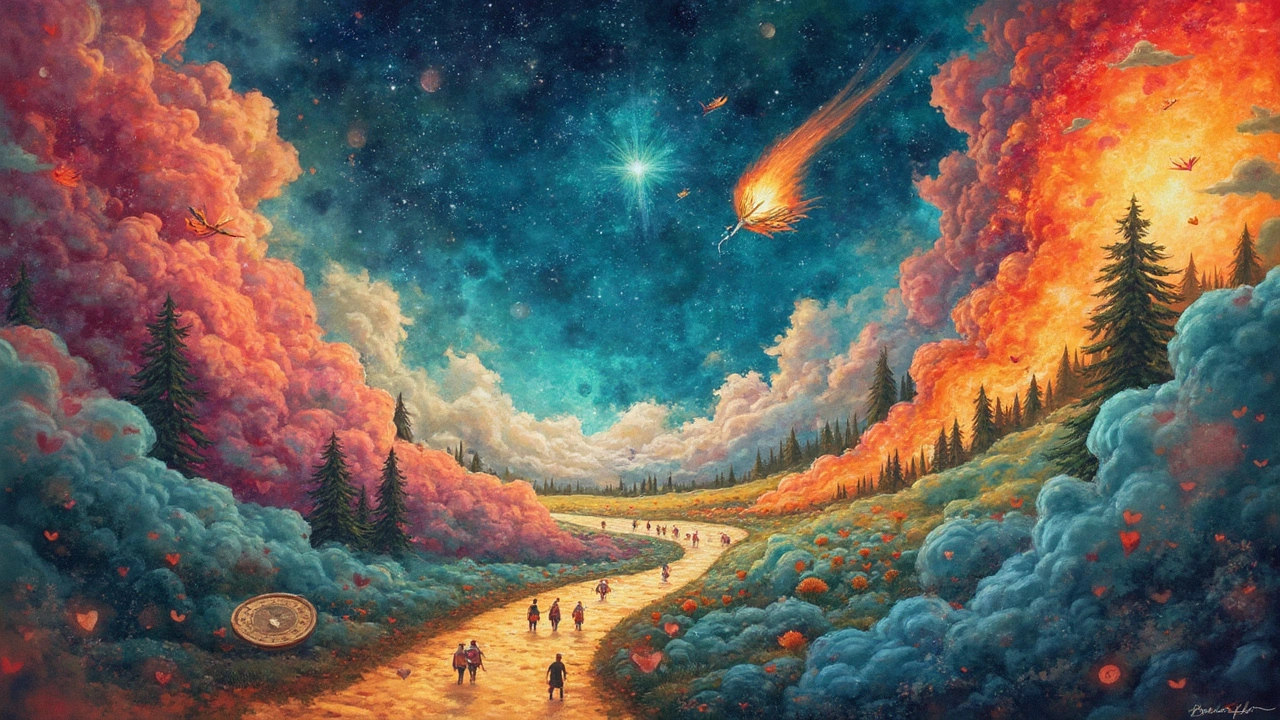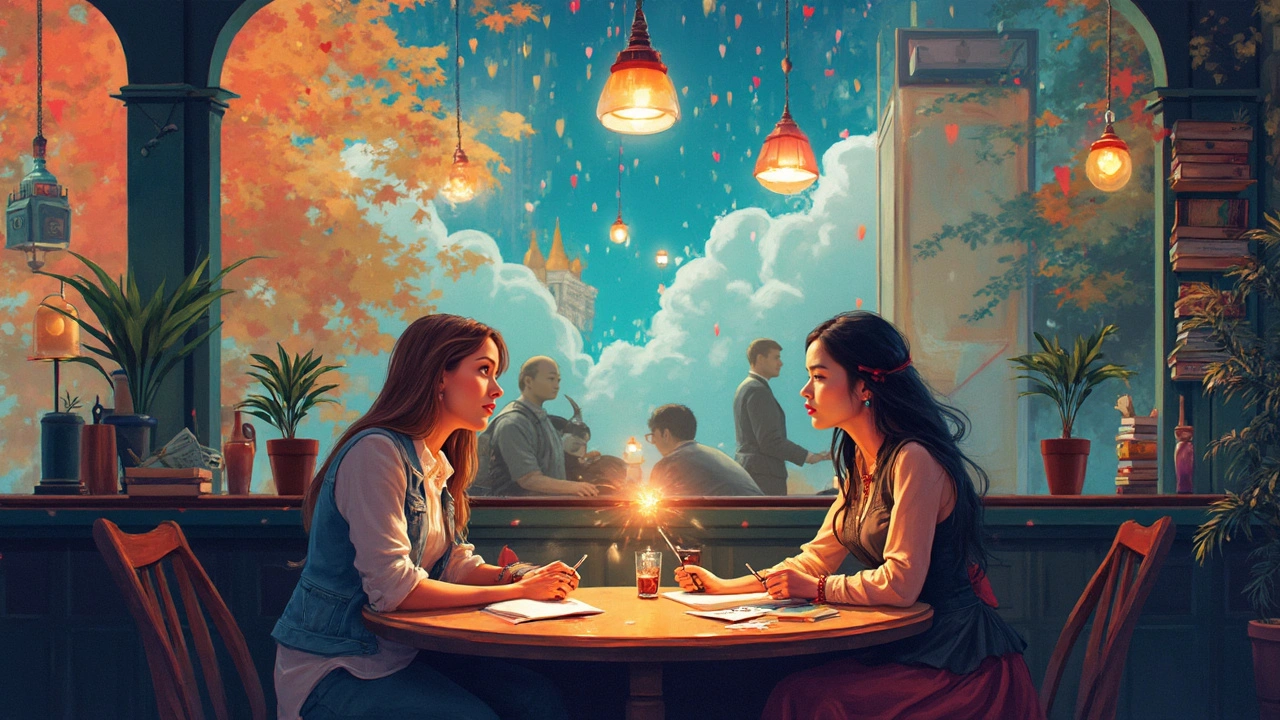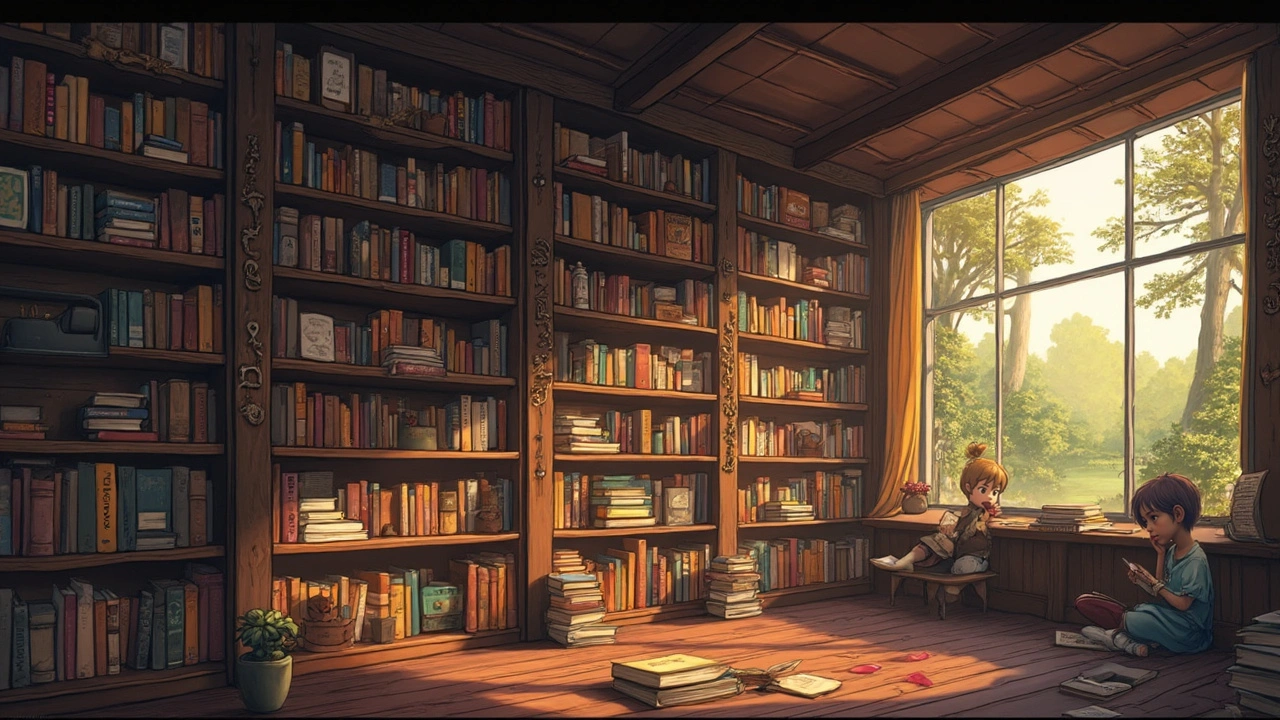Fantasy: Worlds of Magic and Wonder
Fantasy is a genre that lets our imaginations run wild. It's all about magic, mythical creatures, and worlds that defy the norms of reality. Remember reading 'Harry Potter' and feeling like you could almost touch Hogwarts? That’s the magic of fantasy. This genre often includes a quest or an epic journey, and while all ages enjoy it, there's a special charm for younger readers. Consider Tolkien's carefully structured Middle-Earth, where every mountain and creature fits into a rich history. Fantasy doesn't just throw random elements together; it intertwines them with themes of good versus evil, friendship, and courage. One fascinating thing is how fantasy creators often draw from mythology and folktales, giving old stories new life and a modern twist. So what makes a fantasy gripping? It usually offers a blend of relatable characters and the wonder of the impossible, creating an emotional pull that keeps us hooked. Want to know a tip for writing fantasy? Start with a "what if" scenario and build your world around that question.

Science Fiction: Beyond the Known Universe
Science Fiction, or Sci-Fi, explores futuristic concepts and technological advances. It's a playground for ideas about what could be, mixing science with imagination seamlessly. We owe many modern tech innovations to Sci-Fi's visionary ideas long before they existed. Think of Arthur C. Clarke's "2001: A Space Odyssey" and how it predicted smart tech years ahead of its time. A solid Sci-Fi tale often deals with humanity's relationship with technology, space exploration, time travel, and even alien life. What makes it exciting is the "what if?" factor—what if we could travel faster than light, or what if AI became as intuitive as humans? To dive into Sci-Fi, you don’t have to be a science whiz, but having a curiosity about the unknown certainly helps. This genre serves as a cultural barometer, often reflecting societal concerns and hopes, making it not only entertaining but intellectually stimulating.

Mystery: Solving Puzzles and Unraveling Secrets
Who doesn't love a good mystery? This genre thrives on suspense and the thrill of the unknown. You step into the shoes of detectives, whether professionals like Sherlock Holmes or amateurs caught in extraordinary circumstances. Mysteries are crafted with intricate plots that require readers to piece together clues to solve a puzzle, often leading to unexpected twists. Remember Agatha Christie's intricate plots that pulled readers into a labyrinth of suspects? These stories test our analytical skills and keep our adrenaline pumping with anticipation. An interesting tip for mystery lovers seeking depth: try paying attention to the recurring themes, as many mysteries also tackle human psychology and moral nuances beneath the surface of the whodunit. It's not only about the crime but the underlying motives and the emotional complexity of the characters involved, making it as much about the journey as the resolution.



Comments
Wow, this guide really breaks down the basics of fiction genres in a way that's easy to understand and follow. Honestly, sometimes I get overwhelmed by all the subgenres and different terms authors throw around, so having a clear list of the eight core genres is refreshing.
One thing I liked is the focus on the 'unique elements' that define each genre. Like, science fiction isn’t just futuristic tech and space, but the ideas behind human progress and ethics too. I feel like knowing those elements can totally change how you experience a story.
Has anyone else found that once you get familiar with these genres, it’s easier to recommend books to friends? I mean, it’s like having a secret map to navigate the vast world of fiction. Really cool post!
This is such an insightful overview! I've always loved genre studies because they enrich the reading experience by offering a framework for understanding narrative conventions. This guide is definitely jargon-heavy in the best way possible—it really highlights the intricate nuances that differentiate, say, magical realism from fantasy or psychological thriller from mystery.
One tip I always suggest for readers is to dip into cross-genre works. When authors blend elements from two or more genres, it often results in highly innovative storytelling. So, while the eight genres stand as pillars, the real magic happens in the fusion and interpretation.
It's amusing to see such a broad overview attempt at fiction genres, but honestly, this type of categorization often falls short. The literary landscape is far too complex and nuanced to be boxed into just eight genres without losing much of the depth that defines truly great literature. I find that most readers are happy with surface-level definitions, but to really understand fiction, one must delve deeper beyond labels.
Moreover, the historical evolution of these genres deserves at least as much attention as their unique elements, which are often just surface descriptors. Without a thorough analysis, we risk diluting the impact and richness of what fiction really offers. I hope the guide at least touches on some seminal works per genre to give context.
Still, it's a starting point for some, I suppose.
I really appreciate the effort to guide readers through the essential fiction genres. For many people, the world of fiction can be overwhelming, and a clear, accessible guide like this can serve as a much-needed introduction.
Genres define the mood, tone, and expectations, which helps in setting the stage for a fulfilling reading experience. Also, knowing these genres encourages exploration beyond one's usual preferences, opening doors to new insights and empathy for varied life experiences.
We shouldn't dismiss the value of categorization outright—it's more about how we use it. I hope the guide encourages readers to not let genres confine them, but to inspire curiosity and discovery.
Okay, but isn’t it kind of suspicious that the listing is so neat and tidy? Like, who decided these are the ‘eight core’ genres anyway? Sounds like someone is trying to control what stories we’re allowed to appreciate and consume.
There’s always something underneath these neat little guides, and I can’t help but wonder if this is part of a bigger agenda to standardize what counts as culture. What about all the subversive or underground fiction that doesn’t fit into these categories? Seems like an erasure problem to me.
We should be cautious about any supposedly objective framework—it’s never really objective, is it?
Honestly, this guide is just another oversimplification of a complex cultural phenomenon. Fiction isn't some neat checklist to be ticked off with trendy tags; it’s a reflection of society, morality, and human struggle, which no eight mythical genres can capture adequately.
And does this guide even acknowledge the problematic themes hidden behind some genres? For example, romance and fantasy often reinforce problematic tropes that deserve critical scrutiny rather than shallow celebration.
Readers need critical tools, not just glossy categorization.
I find that such guides are helpful, especially for those just starting to explore fiction more seriously. Knowing the core genres gives a sort of framework to approach the vast number of books out there, and it’s less intimidating to navigate when you’re not entirely sure what you like yet.
That said, it’s important to remember that many works blur the lines between genres, which is part of what makes fiction so interesting and unpredictable.
Have any of you encountered books that defy or mix these genres in ways that surprised or delighted you? Would love to get some recommendations.
I concur that outlining the eight core fiction genres is a commendable endeavor when done with precision. The practicality of such a guide comes from clear definitions and examples, not vague descriptions.
For instance, distinguishing between speculative fiction, fantasy, and science fiction needs grammatical clarity and contextual accuracy, else the guide fails its purpose.
Also, a list of notable authors or key texts per genre could greatly enhance reader engagement and understanding.
This post gave me some good vibes as someone trying to find new books to read! It’s sometimes overwhelming to pick up just the right book when there are so many genres and sub-genres out there.
I really like the idea of a reader’s guide like this. It can help folks not only to figure out what makes a genre distinct but also to push the boundaries by suggesting they try something new, even if it’s outside their comfort zone.
Has anyone used a guide like this before? Did it change what you picked up next? Curious to hear some stories.
From a somewhat analytical perspective, genre categorization is a natural human attempt to organize complex data — in this case, narratives. Yet, it's crucial that this categorization is done with nuance that preserves the semantics and the semiotics embedded in each category.
The problem with some popular guides is that they are often jargon-light to the point of losing precision, which can lead to misunderstandings. For example, the concepts of magical realism and fantasy seem to be conflated often, which is quite erroneous.
I’d love to see more discourse on this topic among people who appreciate the subtle differences, as it adds to the richness of how we interpret fiction.
It’s a nice post that gets readers introduced to major fiction types. I appreciate how it breaks it down simply without rushing into complex literary theory stuff. From a casual reader’s view, that makes it approachable.
However, I do think it can feel a bit generic. Maybe the guide could include some fun tips like what to expect emotionally or what kind of narratives to look for in each genre. Just to add a layer of engagement.
Also, I wonder if new readers always stick to genres or if they like to explore blended or cross-genre stories more.
I agree that having a foundational knowledge of the main fiction genres is beneficial for readers. Familiarity with genre conventions helps us appreciate the creative twists authors bring to their work.
However, I feel the guide should also emphasize the fluidity of genres today in contemporary literature, where boundaries are frequently crossed, making rigid categories less relevant.
Is anyone else here reading a book that defies these traditional categories? Would be cool to share those experiences and discover how authors innovate within or beyond genre expectations.